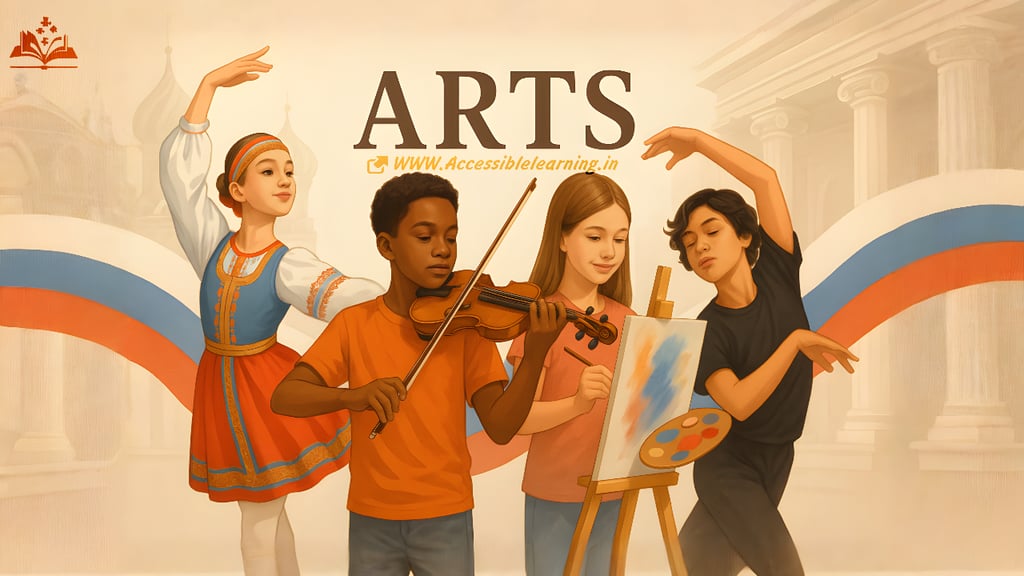
Children of Russia International Competition-Festival: A Comprehensive Guide to Russian Youth Cultural Initiatives
Comprehensive guide to the Children of Russia International Competition-Festival. Explore participation requirements, categories, benefits, and the application process for young artists worldwide.
EVENT/SPECIALSTORY/ENTERTAINMENTRUSSIACELEBRATION/FESTIVALS
Kim Shin
9/25/20257 min read


The landscape of international children's cultural competitions and festivals in Russia encompasses numerous initiatives designed to showcase young talent, foster cultural exchange, and promote artistic development among youth from Russia and around the world. While specific documentation of a singular "Children of Russia" International Competition-Festival remains limited in current public records, Russia hosts multiple significant youth-oriented cultural events that serve similar purposes in celebrating children's creativity and international cooperation.
Understanding Russian Children's Cultural Festivals
The Broader Context of Youth Festivals in Russia
Russia has established itself as a significant host nation for international youth cultural events, with various competitions and festivals taking place throughout the year. These events typically focus on multiple artistic disciplines, including music, dance, theater, visual arts, and film production, providing platforms for young artists to showcase their talents on an international stage.
The Russian Federation's commitment to youth cultural development is evident through its support of various festival initiatives that bring together participants from dozens of countries, creating opportunities for cultural exchange and artistic growth among young people aged 5 to 18 years.
Key Components of Russian Youth Cultural Competitions
Most Russian international children's competitions and festivals share several common elements that make them distinctive in the global cultural landscape. These events typically feature multiple competition categories spanning traditional and contemporary artistic disciplines, with participants competing in age-appropriate groups that ensure fair evaluation and meaningful participation opportunities.
The festival format usually includes preliminary online submissions or regional qualifying rounds, followed by live performances or exhibitions during the main festival period. Professional judging panels, often comprising internationally recognized artists and educators, evaluate submissions based on technical skill, creativity, cultural authenticity, and overall artistic impact.
Festival Categories and Participation Opportunities
Musical Competitions
International children's music competitions within the Russian festival circuit typically encompass classical music, folk traditions, contemporary popular music, and vocal performances. Young musicians compete in solo and ensemble categories, with opportunities to perform with professional orchestras and participate in masterclasses led by renowned musicians.
Participants often represent their home countries' musical traditions while also demonstrating proficiency in Russian classical repertoire, creating a rich tapestry of international musical exchange that celebrates both cultural diversity and shared artistic excellence.
Dance and Choreography
Dance competitions within Russian children's festivals frequently showcase ballet, folk dance, contemporary choreography, and cultural dance traditions from participating nations. These competitions serve not only as performance opportunities but also as cultural education experiences where young dancers learn about movement traditions from around the world.
Professional choreographers and dance educators provide feedback and instruction, helping young performers refine their technique while encouraging creative expression and cultural understanding through movement arts.
Theater and Dramatic Arts
Theatrical competitions often include monologue presentations, short scene performances, and full dramatic productions created specifically for festival participation. Young actors have opportunities to work with professional directors and participate in workshops that enhance their performance skills while exploring theatrical traditions from various cultures.
The emphasis on storytelling and dramatic interpretation helps participants develop communication skills, cultural awareness, and artistic confidence that extends beyond the festival experience.
Visual Arts and Creative Expression
Visual arts competitions typically encompass painting, drawing, sculpture, digital art, and mixed media creations that reflect both individual creativity and cultural themes. Young artists often create works that represent their home countries' artistic traditions while exploring universal themes that resonate across cultural boundaries.
Exhibition opportunities allow participants to display their work alongside international peers, creating gallery experiences that celebrate the diversity and talent of young artists from around the world.

Application Process and Requirements
Eligibility Criteria
Most Russian international children's competitions establish age-based categories that typically range from early childhood through late adolescence, with specific divisions that ensure appropriate competition levels. Participants usually must demonstrate prior experience or training in their chosen artistic discipline, though the exact requirements vary by competition category and age group.
Geographic eligibility often extends to participants from all countries, with special provisions for Russian diaspora communities and students of Russian language and culture programs worldwide. Some competitions may require preliminary video submissions or documentation of previous achievements in relevant artistic fields.
Submission Requirements
Application processes typically require detailed forms completed in Russian or English, along with supporting materials that demonstrate the applicant's artistic abilities and commitment to their chosen discipline. Video recordings, portfolio materials, letters of recommendation, and proof of age are commonly required elements of successful applications.
Technical specifications for video submissions often include specific duration limits, quality requirements, and content guidelines that ensure fair evaluation across all participants. Early application submission is typically encouraged, as many festivals receive significantly more applications than available participation slots.
Selection Process
Selection committees usually comprise experienced educators, professional artists, and cultural representatives who evaluate applications based on artistic merit, technical proficiency, and potential for growth and cultural contribution. The evaluation process often includes multiple review rounds, with final selections announced several months before festival dates to allow adequate preparation time.
Successful applicants typically receive detailed information about travel arrangements, accommodation options, and festival schedules that help participants and their families prepare for the international cultural exchange experience.
Festival Experience and Benefits
Cultural Immersion Opportunities
Participants in Russian children's cultural festivals typically experience comprehensive cultural immersion that extends beyond their specific artistic competitions. Guided tours of historical sites, visits to world-renowned cultural institutions, and interactions with local families provide authentic insights into Russian culture, history, and contemporary life.
Language exchange opportunities allow participants to practice Russian while sharing their own languages and cultural perspectives with Russian peers, creating lasting friendships and international connections that often continue long after the festival concludes.
Professional Development
Master classes led by distinguished artists and educators provide participants with advanced instruction that often exceeds what may be available in their home communities. These intensive learning experiences help young artists refine their skills while gaining exposure to different teaching methods and artistic approaches.
Performance opportunities in prestigious venues allow participants to experience the excitement and challenge of presenting their work to discerning audiences, building confidence and stage presence that benefits their ongoing artistic development.
International Networking
The international nature of these festivals creates unique networking opportunities for young participants, their teachers, and accompanying family members. Connections formed during festival participation often lead to ongoing cultural exchanges, collaborative projects, and future educational opportunities.
Alumni networks from Russian children's festivals frequently maintain contact through social media and organized reunions, creating global communities of young artists who support each other's continued artistic growth and cultural understanding.
Planning and Preparation
Travel and Accommodation
Festival organizers typically provide comprehensive information about travel requirements, including visa procedures for international participants, recommended travel routes, and airport transfer arrangements. Group travel options are often available for participants from the same countries or regions, helping to reduce costs and provide additional safety and support.
Accommodation arrangements usually include carefully vetted host families, student residences, or hotels that cater specifically to international youth travelers. Meal arrangements typically accommodate dietary restrictions and preferences while introducing participants to Russian cuisine and dining customs.
Cultural Preparation
Pre-festival orientation materials often include information about Russian customs, basic language phrases, cultural expectations, and practical tips for international travel. Participants are typically encouraged to prepare presentations about their home countries' cultures, creating opportunities for mutual cultural learning during the festival.
Climate considerations and appropriate clothing recommendations help participants prepare for Russian weather conditions during their visit, ensuring comfort and enjoyment throughout their cultural exchange experience.
Artistic Preparation
Detailed performance guidelines help participants prepare their competition materials according to specific technical requirements and artistic standards. Practice recommendations and suggested repertoire lists provide structure for pre-festival preparation while allowing flexibility for individual artistic expression.
Equipment and instrument considerations are typically addressed in advance, with information about available resources and requirements for participants to bring their own specialized materials or instruments.
Impact and Recognition
Awards and Recognition
Russian children's cultural festivals typically offer various recognition levels that celebrate both individual achievement and cultural contribution. Grand prizes often include monetary awards, performance opportunities, and invitations to participate in advanced cultural exchange programs.
Certificate awards and participation recognition provide meaningful acknowledgment of effort and cultural engagement, even for participants who may not receive top competitive placement but demonstrate significant artistic growth and cultural understanding.
Long-term Benefits
Participation in international children's cultural festivals often provides lasting benefits that extend well beyond the immediate festival experience. Enhanced cultural awareness, improved artistic skills, increased confidence in international settings, and expanded global perspectives frequently influence participants' educational and career choices.
Alumni of Russian children's festivals often report that their participation experiences influenced their decisions to pursue international studies, careers in arts education, or professional artistic development opportunities that might not have been considered without their festival experiences.


Frequently Asked Questions
What age groups can participate in Russian children's cultural festivals?
Most Russian international children's festivals accommodate participants ranging from early childhood through late adolescence, typically organized in age-appropriate categories such as 5-8 years, 9-12 years, 13-15 years, and 16-18 years. Specific age divisions may vary depending on the artistic discipline and competition format.
How are participants selected for international festivals in Russia?
Selection processes typically involve multiple evaluation stages, beginning with application review, followed by assessment of submitted materials such as videos, portfolios, or recorded performances. Final selections are made by panels of experienced educators and professional artists who evaluate artistic merit, technical skill, and potential for cultural contribution.
What support is provided for international participants?
Russian festival organizers typically provide comprehensive support, including airport transfers, accommodation arrangements, meal plans, cultural orientation, and guided sightseeing opportunities. Translation services, medical support, and 24-hour supervision ensure participant safety and comfort throughout their stay.
Are there scholarships or financial assistance options available?
Many Russian cultural festivals offer various forms of financial assistance, including full scholarships for exceptional participants, partial funding for travel and accommodation costs, and group discount arrangements. Specific availability and criteria for financial support vary by festival and are typically outlined in application materials.
What should participants expect from the cultural exchange experience?
Participants can expect intensive artistic instruction, performance opportunities in prestigious venues, cultural immersion activities, language exchange possibilities, and the chance to form lasting friendships with peers from around the world. The experience typically combines competitive elements with educational and cultural enrichment opportunities.
How can teachers and schools get involved in Russian cultural festival programs?
Educational institutions can participate by nominating qualified students, organizing group applications, and serving as liaison points for communication between festival organizers and participant families. Many festivals offer special recognition for participating schools and may provide professional development opportunities for accompanying educators.
Russian international children's cultural festivals represent significant opportunities for young artists to experience cultural exchange, artistic growth, and international recognition within the context of one of the world's richest cultural traditions. These events serve as bridges between cultures, fostering understanding and appreciation among young people from diverse backgrounds while celebrating the universal language of artistic expression.
The impact of participation in these cultural initiatives extends far beyond the immediate festival experience, often influencing participants' lifelong perspectives on international cooperation, cultural understanding, and artistic development. For families, educators, and young artists considering international cultural competition opportunities, Russian festivals offer unique combinations of artistic excellence, cultural immersion, and global community building that create memories and connections lasting well into adulthood.
As Russia continues to develop and expand its international cultural programming for children and youth, these festivals serve as important components of cultural diplomacy and international education, demonstrating the power of artistic expression to unite young people across national and cultural boundaries in celebration of creativity, talent, and shared human experience.
Subscribe To Our Newsletter
All © Copyright reserved by Accessible-Learning Hub
| Terms & Conditions
Knowledge is power. Learn with Us. 📚


